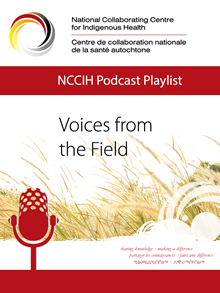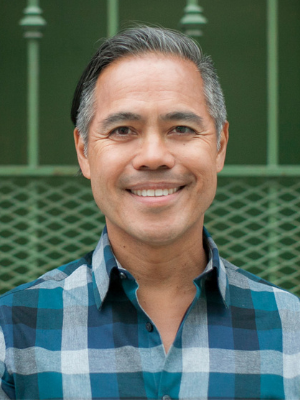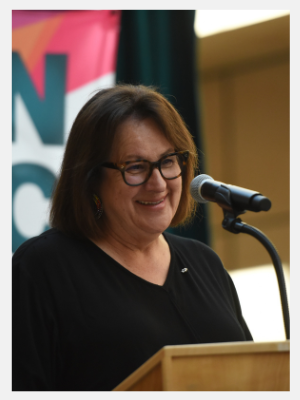 NCCIH Voices from the Field Podcasts
NCCIH Voices from the Field Podcasts
Voices from the Field
Welcome to Voices from the Field, a podcast series produced by the National Collaborating Centre for Indigenous Health (NCCIH), which focuses on innovative research and community-based initiatives promoting the health and well-being of First Nation, Inuit and Metis peoples in Canada.
Episode 23 – A discussion of Visioning the Future: First Nation, Inuit, and Métis Population and Public Health
The COVID-19 global pandemic has underscored and exacerbated inequities in public health, drawing attention to the crucial need to articulate a public health vision for Indigenous Peoples that conceives of a healthier, more equitable future. In this episode, Dr. Evan Adams and Dr. Margo Greenwood discuss the creation and contents of a collaborative report by the NCCIH offering a vision for First Nations, Inuit, and Métis peoples’ public health. The commissioned report not only complements the Chief Public Health Officer’s 2021 public health vision report, but also privileges Indigenous knowledges. Visioning the Future represents a multifaceted vision as articulated by Indigenous Peoples from coast to coast to coast.
Listen on SoundCloud
Bios

Dr. Evan Tlesla ll Adams is a Coast Salish actor and physician from the Tla’amin First Nation near Powell River, BC, Canada.
Evan completed a Medical Doctorate from the University of Calgary in 2002, and a residency in the Aboriginal Family Practice program at St. Paul's Hospital in Vancouver, BC. Dr. Adams has a Masters of Public Health (2009) from Johns Hopkins University in Baltimore, MD. He was the first-ever Aboriginal Health Physician Advisor in the Office of the Provincial Health Officer, BC Ministry of Health (2007-2012). He was the Deputy Provincial Health Officer for BC from 2012 to 2014. He then served as the Chief Medical Officer of the First Nations Health Authority (2014-2020), and is now on exchange with First Nations and Inuit Health Branch, Indigenous Services Canada, as the Deputy Chief Medical Officer of Public Health under Dr. Tom Wong.

Dr. Margo Greenwood, Academic Leader of the National Collaborating Centre for Indigenous Health, is an Indigenous scholar of Cree ancestry with years of experience focused on the health and well-being of Indigenous children, families and communities. She is a Professor in the Education program at the University of Northern British Columbia and was Vice President of Indigenous Health for the Northern Health Authority from 2013 to 2022. Dr. Greenwood has received numerous awards for her achievements in early childhood education and health policy, including the Queen's Jubilee medal (2002), BC Academic of the Year (2010), National Aboriginal Achievement Award for Education (2011.), and most recently, she was honoured to be appointed as an Officer of the Order of Canada (2021.)
Transcript
Julie Sutherland: Dr. Adams, can you speak about how the Visioning the Future report came into being?
Dr. Evan Adams: The Chief Public Health Officer, Dr. Theresa Tam writes a yearly report, and her planned report for 202 was called A Vision to Transform Canada’s Public Health System. So, [its] a visionary document whereby we were asked as public health experts to envision a system that currently doesn’t exist, and if we could create a great system – and COVID showed us that we could have a public health system that could be improved – so, this vision was put in front of us to flesh out.
And Dr. Tam knew that people of colour and marginalized communities were not necessarily a part of the public health system as it currently exists, that we were overly affected by public health issues, including particularly COVID, and as original peoples in Canada, as Indigenous Peoples, certainly our inclusion, or having issues of equity access to the system or equity of outcomes were also central issues. So, Dr. Margo Greenwood and myself endeavoured to ask Indigenous public health experts what their vision was of Canada’s Indigenous public health system. So, we spoke to mainly Indigenous public health officials who were physicians and we asked some public health staff from the National Indigenous Organizations if they wanted to contribute to our… to our vision.
Luckily, or unluckily, we were imagining only a very small supplement to Dr. Tam’s main report. So, each writer ended up with like one or two pages and we asked them to write about any aspect of public health that they felt was really important, and they arrived very quickly at the subject areas that they wanted to talk about: the social determinants of Indigenous health, things like data and governance and the like, things that come up in everyday, run of the mill public health issues.
But what they wrote was not a run of the mill at all. It was actually writing that challenged the reader and the public health audience to do better, to be inclusive, and to have Indigenous people as part of public health generally. So, yeah, it was… it’s really a challenging set of essays.
Julie Sutherland: Dr. Greenwood, the report emphasizes that a determinants of health framework facilitates a holistic view of public health for First Nations, Inuit, and Métis peoples. Can you tell listeners a bit about how the report’s contents support such a framework?
Dr. Margo Greenwood: I think it supports that type of framework in a number of ways. When we think about determinants of health, oftentimes I’ve been asked the question, what does that really mean? And I think the most simple and straightforward answer is, it’s all the things that impact our lives. So, for example, it’s the food we eat, the homes that we live in, whether we have access to healthcare services, or do we have access to education? Early childhood services, if we have families and young children? All of these kinds of things impact our lives. We often use the word holistic when we’re talking about this kind of approach because it’s all those things that impact us.
I think a determinants of health approach also helps to expose inequities that First Nations, Inuit, and Métis people experience every day in Canada. And I think it’s really important for that. The report itself, and the authors really, started to look at that approach and how can we create change in our lives? And so they really focused on things like self-determination, Indigenous knowledge, strengths-based approaches, and elements of resilience. We’ve been resilient people for hundreds of years, and so we have a lot of strengths to draw upon.
In the report itself, there’s a number of the chapters that do focus on self-determination. Self-determination is a theme for many of the chapters in the Visioning the Future document. And the three NIOs – the Assembly of First Nations, Inuit Tapiriit Kanatami, and Métis National Council – you can see that theme of distinctions-based approaches and self-determination woven throughout their writings.
Other chapters also focus on self-determination for First Nations, Inuit, and Métis peoples, and in their look at the future of public health, for example, in Marcia Anderson’s writings, she contemplates self-determination, as does Shannon McDonald in her document around governance by First Nations and for First Nations. These are really important themes, especially when we look at the urban Indigenous population, so, First Nations, Inuit, and Métis people living in urban settings. There’s a phrase that Sarah Funnell uses in her writing and it’s… the phrase is “nothing about us, without us.” So again, another look at self-determination, and we really begin to look at that as we look at Danièle Behn Smith’s work around data and the self-determination over data. And her chapter, “The Grandmother’s Perspective,” it kind of warms your heart because it’s anchored, as all of these are anchored, in Indigenous values and Indigenous knowledges. I think that Janet Smiley’s chapter that we have also really builds on this theme as well, as she looks at assessment and responses to First Nations, Inuit, and Métis well-being. And she really does offer us a framework – features of what could be an ideal health assessment and response. These are really important as Indigenous people – First Nations, Inuit, and Métis people – strive for self-determination over their lives, and particularly in the public health sector.
The remainder of this document, in Visioning the Future, offers us some learning around some specific topics but also, while having all of these characteristics, really delve into the topic themselves. So, for example, racism, the impact of racism on our lives, on every dimension of Indigenous Peoples’ lives. It cannot be understated, if you will. Mental health, mental well-being, is really important, especially as we come out of COVID-19, we’re seeing it. It’s just glaringly apparent. And I think it’s that COVID has really exacerbated already existing realities for First Nations, Inuit, and Métis peoples in this area.
There’s also a really important chapter on infectious diseases that I think has long been a challenge for many people, but in particular for First Nations, Inuit, and Métis peoples. And I think that that section in the document really describes of some of those realities experienced by the people.
And finally, we cannot ever forget about the environment. Climate change right now is glaringly apparent, in front of everybody’s faces. The environment, the connection, spiritual connection to the land, our spiritual well-being, is based upon our connections and relationships to the land and all beings within that ecosystem.
The document itself then takes us on a journey through self-determination, through data, through mental well-being, through racism, through the environment, and really gives us a holistic glimpse into some areas that we would like to see change in the future.
It’s important to note that in Visioning the Future, there were many authors and many contributors I didn’t have an opportunity to name, but know that those authors names can be found in the document itself. So, I encourage you to reach out, to read the document, and reach out to those authors if you have questions.
Julie Sutherland: Dr. Adams, where do you see this vision going from here? How can it be turned into a reality?
Dr. Evan Adams: Well, there are lots of things that can happen in the current state of public health that could improve the inclusion of Indigenous Peoples and Indigenous public health officials. One of them is to empower Indigenous populations, probably through their leadership, like through their National Indigenous Organizations, to have public health officials and to carry out public health functions, core public health functions, like data gathering, establishing data governance, data sharing agreements, so that Indigenous identifiers, for instance, could be matched to provincial data sets, like around cancer or physician diagnostic codes, or just very straightforward – what I would call, standard public health functions – just could be boned up and made better.
We could also empower public health officials to join primary care so that they’re together, so that you’re not just monitoring the population, you’re taking care of population. And public health officials could be empowered to look at the social determinants of Indigenous health. And there are some very specific social determinants of Indigenous health that are unique to Indigenous people that don’t get a lot of attention. Things like our access to culture and to language, self-determination, the effects of colonization. Those are the things that the general public health system doesn’t deal with. Also, issues like political might or political discourse or political will are determinants of Indigenous public health, in my opinion.
And then there are just some very sensible pieces that we know affect Indigenous people in the social determinants of Indigenous health that could be just better dealt with. Things like racism, anti-racism. We could have a better communicable disease system. The chiefs have already named mental wellness as a priority for at least a couple of decades. So, there’s more work that could be done there. And even just simple mental wellness data, evaluation of mental wellness programs. Those are just really, really, core. I also think that we need to add Indigenous knowledge, traditional knowledge, into the practice of public health. Public health practice was invented without input from Indigenous people.
So, we can indigenize public health, decolonize it, and help it be more meaningful to our people. Like how can the system serve Indigenous Peoples? That means a conversation with Indigenous Peoples. It means not just public health practice, but research into Indigenous public health or the academy of Indigenous public health. How we think about Indigenous people, Indigenous public health, could be better shaped. It could be… it could be fleshed out a bit better. And then I think Indigenous viewpoints – like around how we see the land and our territories, how we see the earth, how we see climate change – that are very unique, holistic, informed by our knowledges, could also be explored and added into how the science public health is currently actioned.
And of course, last of all, we could have a relationship between Indigenous public health and Canadian public health so that those two systems can walk together, separate but walking together, and in a relationship rather than having, you know, public health dominate Indigenous Peoples’ lives and, and not have Indigenous voices be heard. That old way of doing business just needs to go away.
Julie Sutherland: Dr. Adams, Dr. Greenwood, thank you so much for taking the time to speak with me today about this inspiring and achievable vision for public health for First Nations, Inuit, and Métis peoples living in Canada.
To hear more podcasts in this series, head to the Voices from the Field on the National Collaborating Centre for Indigenous Health, nccih.ca. Music on this podcast is by Blue Dot Sessions. It appears under a creative commons license. Learn more at www.sessions.blue.
Download the transcript